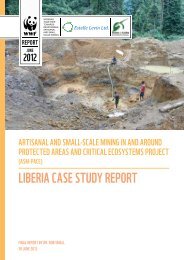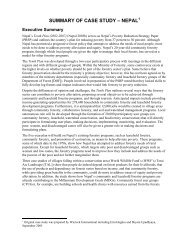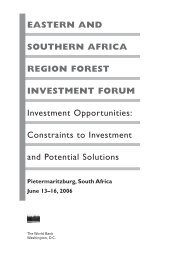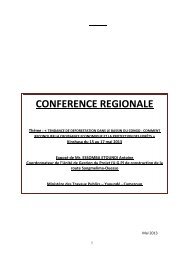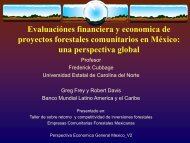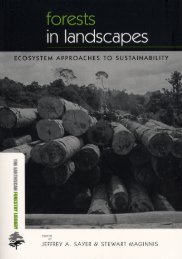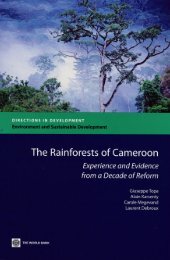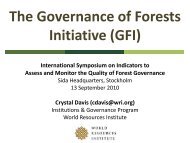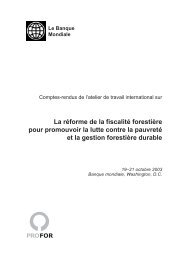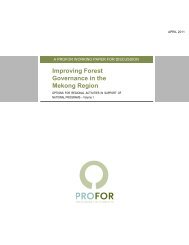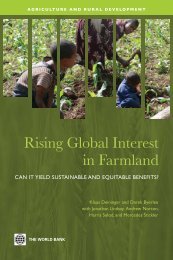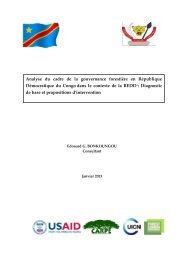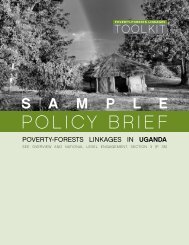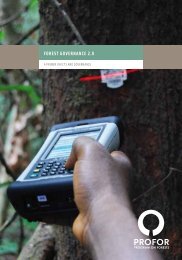INVESTING IN TREES AND LANDSCAPE ... - PROFOR
INVESTING IN TREES AND LANDSCAPE ... - PROFOR
INVESTING IN TREES AND LANDSCAPE ... - PROFOR
Create successful ePaper yourself
Turn your PDF publications into a flip-book with our unique Google optimized e-Paper software.
For investors, tenure is generally understood as a legal right that creates an asset that can be<br />
assigned; for instance, as an asset on the balance sheet or as collateral for a loan. The investor<br />
needs to identify how rights to land and standing timber are held by the company.<br />
Governments, in most cases, understand tenure as a strategic tool to confer the benefits of land use<br />
on different interest groups while retaining the freehold and receiving rent in return.<br />
These interests are not necessarily incompatible, but they do need clarification. There is some<br />
tension: rights claimed by communities might be ignored by the government, and local recognition<br />
of rights might not be sufficiently robust for investors. Conversely, leases granted by the government<br />
without local consent are not consistent with FPIC principles and thus do not constitute sustainable<br />
investment (and carry significant risks for the investor). All three parties need to be in a position to<br />
negotiate these rights.<br />
Securing tenure rights requires a variety of governance tactics premised on a number of legal<br />
ingredients, the sum of which provide the necessary security for a forest or landscape enterprise<br />
(RRI 2009):<br />
• Duration—sufficient to provide an incentive for communities to invest in the forest and in<br />
businesses that might sustainably use it.<br />
• Assurance—clearly prescribed, avoiding any ambiguity or distinction between subsistence and<br />
commercial use or between land and forest rights; guaranteeing returns from any investment.<br />
• Robustness—easily defensible in a court of law and so widely prescribed and disseminated<br />
that they permeate the day-to-day practice of forest officers, transport police, customs, and the<br />
judiciary.<br />
• Exclusivity—no overlap between the commercial forest rights of communities and those of<br />
external investors or government agencies.<br />
Simplicity—free of excessive bureaucratic steps, lengthy documents, costly registration procedures<br />
in distant offices, and so on.<br />
Investing in capacity building<br />
Improved capacity should be an expected outcome of investments; people generally learn by doing,<br />
and increased capacity enhances opportunities for future investment. However, some degree of<br />
capacity is required in the earlier stages to complete the basic tasks:<br />
• Organize the rights-holders into a coherent entity with professional business roles.<br />
• Secure the necessary formal commercial access rights and operating permits.<br />
• Identify the business opportunity/value proposition.<br />
• Understand the nature of the deal and any proposed relinquishment of control.<br />
• Negotiate the best outcome in response to all parties’ agendas.<br />
• Start up the business on a solid footing.<br />
86 <strong><strong>IN</strong>VEST<strong>IN</strong>G</strong> <strong>IN</strong> <strong>TREES</strong> <strong>AND</strong> L<strong>AND</strong>SCAPE RESTORATION <strong>IN</strong> AFRICA



